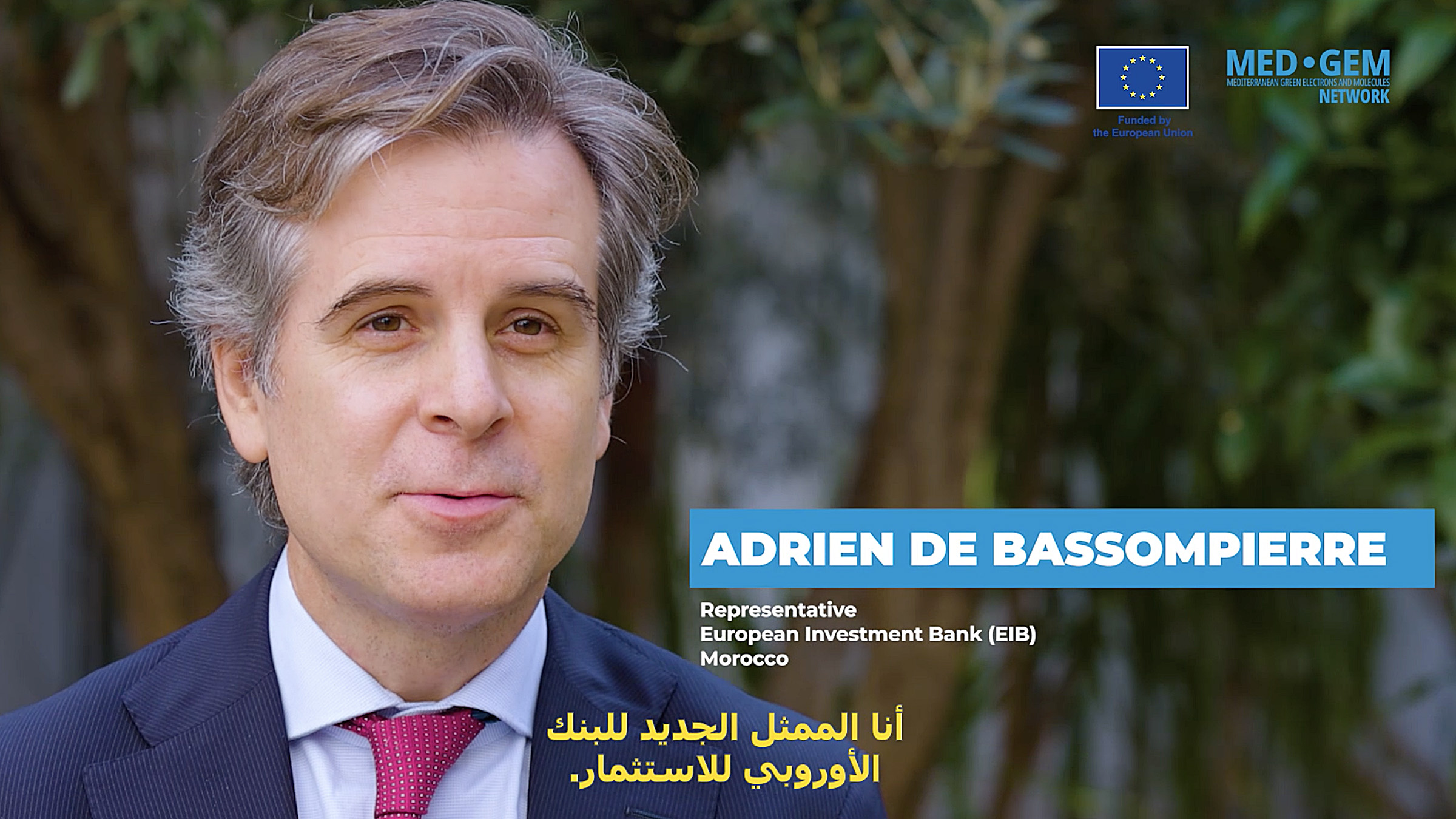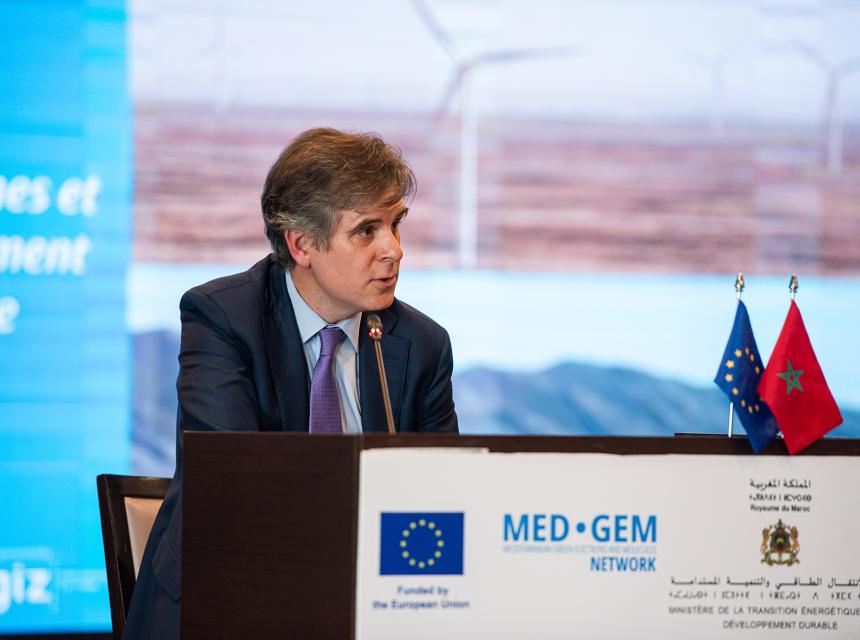The EIB and the Future of Green Hydrogen in Morocco: Interview with Adrien de Bassompierre
In an exclusive interview with MED-GEM Network late December 2023 in Rabat, Adrien de Bassompierre, the new representative of the European Investment Bank (EIB) in Morocco, shares his vision for the future of green hydrogen in the country and the EIB's initiatives to support economic and energy development.

"Can you provide a detailed overview of the role and activities of the European Investment Bank (EIB) in Morocco, as well as its key contributions to the country's economic and financial development?"
The European Investment Bank has existed since 1958. It is governed by the Member States of the Union and has been active in Morocco since 1979 and physically present in Morocco since 2005. This is to illustrate the quality and also the history of the partnership with Morocco. It is really one of our main partners and one of the first countries we engaged with outside the European Union. It is also one of the main partners for us. For us, outside the European Union, we have a very healthy, very diverse portfolio, with not only the Moroccan government, Moroccan national agencies in various sectors such as water, energy, equipment, education, health, and more. We also work with the private sector. We mainly support small and medium-sized enterprises, primarily through Moroccan financial institutions with whom we enter into partnerships. And sometimes, we provide them with assistance. These businesses, whether small or larger enterprises, can benefit from direct investments, funds, or through microcredit. So, this is an overview of our activity here in Morocco.
« Given the detailed overview of your activities in Morocco, Adrien, it's clear that the Bank has been deeply involved in various sectors for a significant period. Can you shed some light on how your institution perceives the evolving role of Morocco in the broader economic landscape, especially in light of the recent global developments and shifts in the energy sector? How does the Bank plan to adapt its strategies to align with these changes and continue supporting Morocco's growth? »
What interests us is primarily energy, and we have long supported Morocco in the development of the energy sector, particularly in strengthening electric grids, and this is still relevant to enable the integration of renewable energies. And this is the second, more recent but not so recent. We have supported the National Office of Water and Electricity and more recently, MASEN, the National Agency for Sustainable Energies for the development of renewable energies in Morocco. This happened through project financing in the wind sector, but also solar projects that are known to all, not only in Morocco but globally. For example, we supported the Nour Ouarzazate project, a solar complex, one of the largest in Africa. The four development phases of Ouarzazate. Now, if I shift a bit more towards hydrogen, it's a sector in the energy industry that is still relatively new, emerging for us, at least outside of the European Union. So far, we have supported numerous initiatives in favor of hydrogen within the European Union, spanning the entire value chain, from production to consumption, by supporting the development of technologies, enhancing their competitiveness, addressing, of course, issues related to mitigating the impact of climate change, and thus, we have a wealth of experience within the European Union. We are gradually turning our attention, of course, towards opportunities outside the European Union, both with considerations for local and national development in line with the development strategies chosen by different countries for themselves, but also with a particular interest in supplying the European Union, as well as markets in hydrogen. There are significant challenges for hydrogen production within the European Union. But if you look at the plans related to hydrogen within the European Union, there is clearly a need as well to import green hydrogen, of course. In any case, this is our course of action to ensure that the quality of hydrogen is ultimately as clean as possible and therefore, in this context, we are turning to countries like Morocco and, of course, Egypt.
But we are exploring other opportunities elsewhere, particularly on the African continent. We have recently funded a study to assess this potential for hydrogen production in Africa, with very promising and encouraging results, firmly placing Morocco, as well as other countries, on the map as those who can bring or have a significant potential for hydrogen production. We also hope that this potential for hydrogen production is not only for the benefit of international markets but also for the benefit of the local market.
So, of course, we encourage the authorities to explore the potential for the use and consumption of hydrogen here, on Moroccan soil, that goes without saying. But it's also to try to strengthen, as I mentioned, the competitiveness of the entire value chain. So, we are looking at all these elements, of course.
In the value chain, our focus lies on enhancing competitiveness and addressing sustainability issues, such as the impact on water resources. Our goal is to gradually reduce both production and consumption costs, along with minimizing energy losses associated with hydrogen transport. Beyond funding, we actively support pilot projects that showcase the business case for hydrogen, providing technical assistance and leveraging our expertise in the field. Shifting the discussion to Morocco, the favorable conditions include a significant potential for renewable energy production, well-developed infrastructure, and a mature strategic vision for the energy sector. The 'Moroccan Offer' under development is eagerly awaited. Geographical proximity to the European market enhances Morocco's potential for substantial energy production, catering to industrial hubs that may require hydrogen for decarbonization, especially in high-emission sectors like heavy industry.
"What are the various means for partners, whether public or private, to contact the European Investment Bank and benefit from its expertise and support in various sectors, especially in energy in Morocco? »
Partners, whether public or private, can contact the European Investment Bank (EIB) through various channels to access its expertise and support, particularly in the energy sector in Morocco. Direct communication is facilitated through the EIB representation in Morocco, with designated points of contact for dialogue. In cases where direct responses to partner needs are not possible, the EIB can connect them with relevant experts, such as those overseeing investments in specific regions or sectors, including the energy sector. Additionally, government agencies, particularly the Ministry of Finance, serve as natural intermediaries and established contacts for communication with the EIB. Other relevant ministries, such as the Ministry of Energy Transition and Sustainable Development, the Ministry of Equipment and Water, and the Ministry of Industry, are also points of contact. Contacts can be established through these ministries and the agencies they oversee. Furthermore, partnerships with entities like ONEE, MASEN, the General Confederation of Moroccan Enterprises, and other regional representatives offer additional channels for interested companies to engage with the EIB. The EIB, headquartered in Luxembourg, remains readily available for direct communication or through these diverse intermediary channels.
« What are the various forms of support that the European Investment Bank (EIB) can offer to renewable energy projects in Morocco ? »
In essence, our approach involves providing financing and technical expertise, including technical assistance. We actively seek partnerships with other entities to collaborate on reducing the cost of financing and project costs, making them more concessional and competitive. This collaboration often takes the form of grants, including investment grants and additional technical assistance funded through external financing. We also explore support mechanisms related to interest rates, such as interest rate subsidies. The key strategy is to combine our financing and technical expertise with the diverse financial tools that our partners can contribute. This synergy, referred to as "Blending," entails the association with other sources of public funding, including foreign European partners and local or national authorities, fostering a comprehensive and collaborative approach to project support, particularly in the context of our operations in Morocco.
« Can you explain how the European Investment Bank combines its funding and technical expertise with other sources of financing, including grants and subsidies, to support projects and reduce costs? »
When evaluating projects, we follow a comprehensive set of requirements, considering not only the financial impact but also the economic, environmental, social, and governance (ESG) impacts, along with technological aspects and market risks. The Due Diligence process is thorough and demanding. Projects that meet the European Investment Bank's (EIB) quality threshold undergo a "De-risking" stage. This term implies that by achieving the EIB quality standard, the project becomes more attractive to other sources of financing, whether public or private. The EIB's commitment to responsibility and support serves as a label that signals effective risk management, encouraging additional investments from external parties. This simplified description outlines the concept of "De-risking" as a mechanism to attract and facilitate broader participation and investment in projects.
« What are the main challenges you identify for the development of the hydrogen sector in Morocco and worldwide, and how does the European Investment Bank plan to address and support them? »
In terms of challenges and conclusions, there is a significant need to support the entire hydrogen sector upstream in terms of renewable energy production. Morocco is seen as having substantial potential, but the infrastructure needs to be in place. The aim is to support a mature technology that is currently not competitive, especially in terms of cost and scale. Encouraging all partners and offering assistance in addressing these challenges is a priority to reduce costs and enable significant scaling. This encouragement is closely linked to past support in the wind energy sector, including offshore wind and floating wind. Public subsidies are deemed essential, at least initially, and there is a call to European partners, including the European Commission and Member States, as well as Moroccan public authorities, to support the emergence of the hydrogen sector. The importance of a regulatory framework and planning is emphasized, highlighting the elements crucial for supporting the industry. In conclusion, these aspects outline the challenges and considerations for the development of the hydrogen sector in Morocco and globally.

